What's Right, Mom?: Beau's Afraid (2023)


Hello, cinephiles! Here I bring you a bomb of the seventh art, something so overwhelming and strange that I loved it. Ari Aster did it again! I have already told you about a short film he made ( The Strangeness of the Johnson, 2011), yesterday I saw another short film (Munchausen, 2014) and I immediately started to watch his most recent work: Beau is afraid. He had previously made a short film about this same film, it was like a small taste of what was to come. It is well known that this director creates stories that are as genuine as they are grotesque, and most of them deal with family trauma in its different facets. This one in particular, is his new spoiled baby, what he wanted to achieve in the audience, he got it... 3 hours of discomfort, bewilderment and a truth so brutal that, at the same time, it could not be believed. Mother horror films are slowly filling up, but this story has so much of those stories and at the same time it has nothing to do; this film is that, in a nutshell: it's all or nothing, there is no middle ground (and thank goodness Aster knows he has an audience to make and unmake). Beau is played by Joaquin Phoenix, I don't think I should say more about it, this guy wastes talent even when he walks. To explain the story, would be to take the fun out of it, but only because that's really how Aster made it. It has an interpretative narrative, subjective and, at the same time, full of tares.

¡Hola, cinéfilos! Aquí les traigo una bomba del séptimo arte, algo tan abrumador y extraño que me encantó. Y es que Ari Aster ¡lo volvió hacer! Ya les he hablado sobre un corto que él hizo ( Lo Extraño de los Johnson, 2011), ayer vi otro corto (Munchausen, 2014) y, en seguida me puse a ver su más reciente trabajo: Beau tiene miedo. Anteriormente había realizado un corto sobre este mismo film, fue como un pequeño abrebocas a lo que se venía. Bien es sabido que este director crea historias tan genuinas como grotescas, y la mayoría de ellas trata del trauma familiar en sus distintas facetas. Esta en particular, es su nuevo bebé consentido, lo que quiso lograr en el público, lo consiguió… 3 horas de incomodidad, desconcierto y una verdad tan brutal que, al mismo tiempo, no podría creerse. El cine de terror de las madres está llenándose poco a poco, pero esta historia tiene tanto de esas historias y a la vez no tiene nada que ver; este film es eso, en resumidas cuentas: es un todo o nada, no hay puntos medios (y menos mal que Aster sabe que tiene público para hacer y deshacer). Beau es interpretado por Joaquín Phoenix, creo que no debería decir más al respecto, este tipo derrocha talento hasta al caminar. Explicar la historia, sería quitarle la gracia, pero solo porque en realidad es así como la hizo Aster. Tiene una narrativa interpretativa, subjetiva y, a la vez, llena de cizaña.

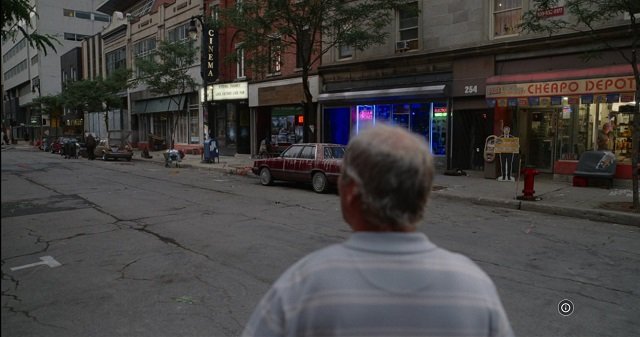

The film is long, 3 hours of what could pass for "madness", and that's exactly what it's about. Beau Wasserman is a middle-aged guy full of fears, insecurities, delusions, in short... in that poor mind there is total chaos, and against all that he has to face in order to visit his beloved mother. During the first act (there are 4) we can see that where Beau develops is full of chaos, dangers, dirt, a murderer running naked... usual things; and as the story has thousands of interpretations, this could easily be Beau's direct perspective on the world. We are in the mind of a person with psychotic breaks from fear and anxiety. Much of what will come up all the time, we won't know if it's a reality in Beau's life, a memory, a dream, a delusion, we just know it's happening to him and that's it, we're left with that information. He tries to get better, goes to a therapist, is prescribed and follows the treatment to the letter... or well, he tries to. We could also be witnessing a kind of metaphor about the decaying society in many parts of the world: drugs, weapons, dangers, garbage, injustice, sanitation, etc.

El largometraje es extenso, 3 horas de lo que podría pasar por “locura”, y exactamente de eso trata. Beau Wasserman es un tipo de edad mediana lleno de miedos, inseguridades, delirios, en fin… en esa pobre mente hay un caos total, y contra todo eso él tiene que enfrentarse para poder ir a visitar a su adorada madre. Durante el primer acto (son 4) podemos ver que donde se desenvuelve Beau está lleno de caos, peligros, suciedad, un asesino corriendo desnudo… cosas habituales; y como la historia tiene miles de interpretaciones, esta fácilmente podría ser la perspectiva directamente de Beau sobre el mundo. Estamos en la mente de una persona con brotes psicóticos por el miedo y la ansiedad. Mucho de lo que saldrá todo el rato, no sabremos si es una realidad en la vida de Beau, un recuerdo, un sueño, un delirio, solo sabemos que le está ocurriendo y ya, nos quedamos con esa información. Él intenta mejorar, va a un terapeuta, es recetado y sigue al pie de la letra el tratamiento… o bueno, eso intenta. También podríamos estar presenciando una especie de metáfora sobre la sociedad en decadencia que se vive en muchas partes del mundo: drogas, armas, peligros, basura, injusticia, sanidad, etc.

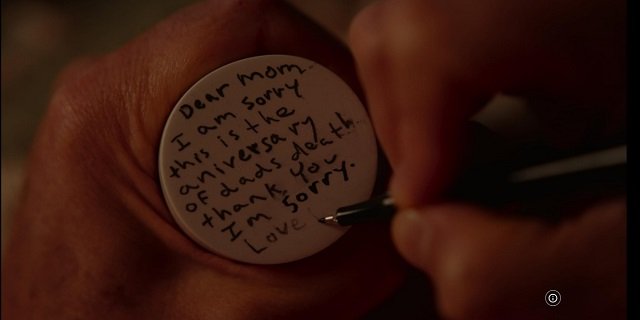

At the same time we know little about Beau, and at the same time we can put ourselves in his uncomfortable shoes; we know he is afraid, but specifically of what, no. There are clear signs of what triggers his anxiety and his inability to make decisions: when he talks to his mother. Not being able to accompany his mother in the annual ritual of accompanying her on the anniversary of his father's death (about whom we know nothing), generates terrible anxiety in him and he tries to explain it to her, but she doesn't understand, she blames him for not being able to make the minimum effort. We don't know (at this point) if the events that happened were real, we don't know if he actually missed the flight because he was mugged or if a mega psychotic break set in, either case is horrible. Then learning of the sudden death of his mother, ends up unleashing chaos in his head. This is where the odyssey of his journey to get to his mother's funeral begins.

A la vez sabemos poco de Beau, y al mismo tiempo podemos ponernos en sus incómodos zapatos; sabemos que tiene miedo, pero específicamente a qué, no. Hay señales claras de qué detona su ansiedad y su incapacidad de tomar decisiones: cuando habla con su madre. El no poder acompañar a su mamá en el ritual anual de acompañarla en el aniversario de muerte de su padre (del que no sabemos nada), le genera una ansiedad terrible y trata de explicárselo a ella, pero no lo entiende, lo culpa por no poder hacer el mínimo esfuerzo. No sabemos (en este momento) si los eventos que sucedieron fueron reales, no sabemos si en realidad perdió el vuelo porque lo asaltaron o si un mega brote psicótico se hizo presente, cualquiera de los dos casos es horrible. Luego enterarse de la repentina muerte de su madre, termina por desatar el caos en su cabeza. Es aquí donde comienza la odisea de su travesía para llegar al funeral de su madre.

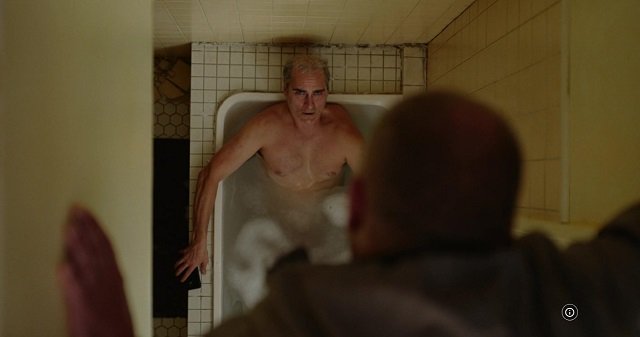

At this point, we can already see a clear behavior of guilt and remorse in poor Beau, he feels bad all the time for not being able to be with his mother the only day he needs him. In some small sequences of images we are going to see him naked, but what will draw the most attention of this will be his huge testicles, keep this in mind for the end. Nothing of what happens in front of our eyes is mere coincidence, it is rather causal, except for the third act, but we still have a long way to go. I try to tell you as tidily as I can, but the story does not allow it.

A todas estas, ya podemos ver una clara conducta de culpabilidad y remordimiento en el pobre Beau, se siente mal todo el tiempo por no poder haber estado con su madre el único día que lo necesita. En algunas pequeñas secuencias de imágenes vamos a verlo desnudo, pero lo que más llamará la atención de esto serán sus enormes testículos, ténganlo muy presente para el final. Nada de lo que pasa frente a nuestros ojos es mera casualidad, más bien es causal, a excepción del tercer acto, pero aun falta para llegar allá. Trato de contarles lo más ordenado que puedo, pero la historia no lo permite.

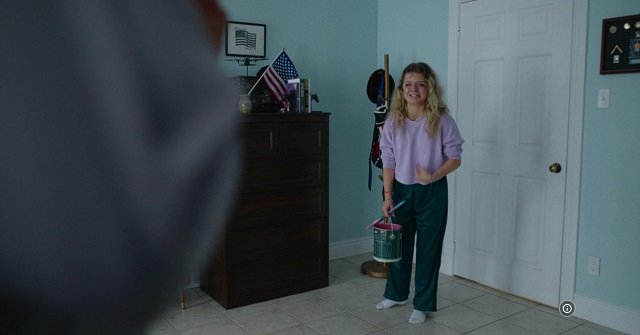

In the midst of Beau's frenzy, he goes out naked into the street looking for help and ends up run over and stabbed by the mad killer who also runs naked everywhere. The people who run him over seem to be good people, they help him, they cure him and medicate him in their own house (by the way, we never know where Beau is), they even put a "health monitor" on his ankle (very attentive of them), everything seems to be normal. But as little time passes, Beau needs to go to his mother's funeral, they make him feel more guilty because he lasted two days unconscious and they are still waiting for him. This is where we see these people start to behave a little strange and give him excuses to take him to his mother's house afterwards. This family also houses their late son's best friend, they went to war and the friend went crazy, no one would accept him and they took him into their home; they have a teenage daughter who is strangely rebellious. Another important detail we see here is that they all self-medicate (except the madman, because aha, "follow a treatment"), they take pills as if they were candy. We also have the other strange detail: they know what Beau's name is and they know that he goes to Wasserton (casual similarity with his last name) to his mother's funeral, after they themselves told him that her death had been a simple nightmare. A few days pass, and already things are getting stranger; the mother has strange conversations on the phone, tells Beau that there are cameras, to watch a specific channel on the TV. At this point the latter should sound familiar, and if not, I'll tell you: The Truman Show; with that you can get a close idea of what could happen. This seems strange to Beau, but he still doesn't understand, seeing his life on TV until the end of his days disconcerts him, but what triggers his terror the most is what happens next: his "stepsister" yells at him (she always yells) that he "failed the stupid test". This awakens a warning sign in Beau and he asks her for explanations, but the girl is so frantic that she ends up committing suicide in front of him.

En medio del frenetismo de Beau, sale desnudo a la calle buscando ayuda y termina atropellado y apuñalado por el loco asesino que también corre desnudo por todos lados. Quienes lo atropellan parecen ser buenas personas, lo socorren, lo curan y medican en su propia casa (por cierto, nunca sabemos dónde se encuentra Beau), hasta le ponen “un monitor de salud” en el tobillo (muy atentos ellos), todo parece ser normal. Pero al pasar el poco tiempo, Beau necesita irse al funeral de su madre, lo hacen sentirse más culpable porque duró dos días inconsciente y todavía están esperando por él. Aquí es donde vemos que estas personas empiezan a comportase un poco extraño y a darle excusas para llevarlo después a casa de su madre. Esta familia también aloja al mejor amigo de su difunto hijo, fueron a la guerra y el amigo quedó loco, nadie lo aceptaba y ellos lo acogieron en su hogar; tienen una hija adolescente que es extrañamente rebelde. Otro detalle importante que vemos aquí, es que todos se automedican (menos el loco, porque ajá, “sigue un tratamiento”), toman pastillas como si fueran caramelos. También tenemos el otro detalle extraño: ellos sabes cómo se llama Beau y saben que va a Wasserton (casual similitud con su apellido) al funeral de su madre, luego de que ellos mismos le dijeron que su muerte había sido una simple pesadilla. Pasan algunos días, y ya las cosas se van tornando más extrañas; la madre tiene conversaciones raras por teléfono, le dice a Beau que hay cámaras, que vea un canal específico en el televisor. En este punto debe sonarles familiar esto último, y si no, pues se los digo: The Truman Show; ya con eso pueden darse una idea cercana de lo que podría ocurrir. Esto le parece extraño a Beau, pero aun no entiende, ver su vida en la televisión hasta el final de sus días lo desconcierta, pero lo que detona más su terror es lo que ocurre después: su “hermanastra” le grita (siempre grita) que él “falló el estúpido test”. Esto despierta una señal de alerta en Beau y le pide explicaciones, pero la chica está tan frenética que termina suicidándose delante de él.



It is here that we enter the third act. Beau runs away from the house, and runs senselessly into the woods until he meets a pregnant woman, Penelope. She takes him to a safe place in the middle of the forest, he finds himself in a community of theatergoers and, surprise, they are all orphans just like him. They invite him to the play that is about to begin and he accepts. At this point he gets so much into the story of the play that it seems like a kind of introspective journey, he fantasizes about what his life would have been like if he had let go of his mother's chains, he would have a house, he would have a wife and children, he would suffer his loss, he would be happy to find his children again... but this fantasy is broken when he tells within himself about his family's curse. His mother told him that his father, his grandfather and great-grandfather, died in the same way: a heart attack at the moment of having an orgasm and that the same would happen to him. "But, father, how did you have us?", that sentence brought Beau back to "reality". Here something happens that puzzles Beau, a man approaches him and tells him that he knows his father, that he is alive, but he interrupts the killing machine of the other deranged man in the house he escaped from, he makes a massacre, but Beau manages to flee again. Tired of it all, he manages to get a ride to Wasserton and arrives at his mother's now-finished funeral.

Es aquí entramos en el tercer acto. Beau sale huyendo de esa casa, y corre sin sentido hacia es bosque hasta que se encuentra con una mujer embarazada, Penélope. Esta lo lleva a un lugar seguro en medio del bosque, se encuentra en una comunidad de teatreros y, sorpresa, todos son huérfanos igual que él. Lo invitan a la obra que está apunto de empezar y él lo acepta. En este punto él se mete tanto en la historia de la obra que se ve como una especie de viaje introspectivo, fantasea de cómo hubiese sido su vida si se hubiese soltado de las cadenas de mamá, tendría casa, tendría esposa e hijos, sufriría su perdida, se alegraría por encontrar a sus hijos nuevamente… pero esta fantasía se rompe cuando él mismo cuenta dentro de ella misma cuenta la maldición de su familia. Su madre le contó que su padre, su abuelo y bisabuelo, murieron de la misma forma: un infarto al momento de tener un orgasmo y que lo mismo le sucedería a él. “Pero, padre, ¿cómo nos tuviste?”, esa frase trajo de nuevo a Beau a la “realidad”. Aquí sucede algo que desconcierta a Beau, un hombre se le acerca y le dice que conoce a su padre, que él está vivo, pero interrumpe la maquina asesina del otro trastornado de la casa de donde se escapó, hace una masacre, pero Beau logra huir nuevamente. Cansado de todo, logra conseguir un aventón hasta Wasserton y llega al ya finalizado funeral de su madre.

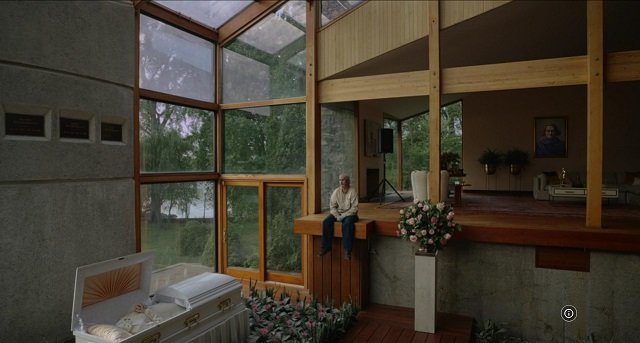

Here we enter the final act, to discover that Mona, Beau's mother... is not dead. Pure brutality, indignation, doubt, fear, you don't know what to feel because already at this point Beau is more than upset. He wants answers, he has so much rage, so much fear, he wants to be brave at the same time, but he is defeated and mentally exhausted; plus his mother got him in full ecstasy with his first and only love, Elaine, where he also realizes that it is a lie that he dies if he climaxes.

Aquí se da entrada al acto final, para descubrir que Mona, la madre de Beau… no está muerta. Brutalidad pura, indignación, duda, miedo, no sabes qué sentir porque ya Beau en este punto está más que trastornado. Quiere respuestas, tiene tanta rabia, tanto miedo, quiere ser valiente al mismo tiempo, pero esta derrotado y agotado mentalmente; además de que su madre lo consiguió en pleno éxtasis con su primer y único amor, Elaine, donde también se da cuenta de que es mentira que muere si alcanza el clímax.

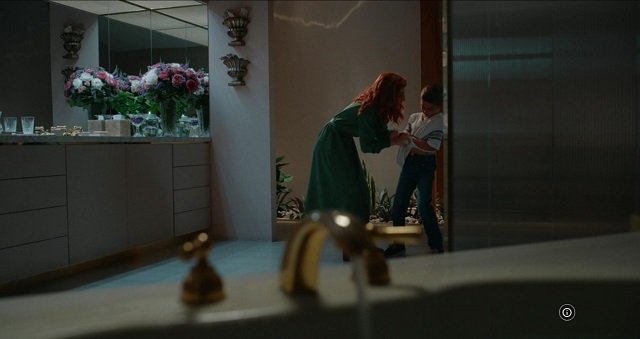

With all that, come the final scenes, Beau discovers that it was all a theater staged by his mother and that she was making money at the expense of her son's suffering. At this stage we are bombarded with so much information that we are left the same as at the beginning: without knowing or understanding anything. Here it is left to the free interpretation of the viewer, because the whole film has so many symbolisms and winks that, by this point, we have already created at least a theory about what really happens. And remember, everything is subjective, the narrative can be seen simply from the point of view of Beau's mind, see it as someone from the outside looking to understand, or make sense of it from so many sides that in the end it makes us crazier. Although if we look for the easy and "simple" answer to understand what happened here, this: Mona made her son "love" her by generating mistreatment (physical and psychological) and constant terror to anything in life, she blamed him simply for existing and not returning all the love that mommy gave him. Mona had a retinue of employees willing to do anything for an exorbitant amount of money; these employees coexisted in Beau's world making his most dreaded anxieties and fears come true. So what at first we thought was a vision from Beau's mind, turns out to be a theater meticulously put together to make him suffer and blame him for letting her die; she takes it to such an extreme that "her death" turned out to be the death of little Beau's nanny, besides going out to claim him because he slept with Elaine. Mona always reproaches her son for anything insignificant, because she does not understand the devotion she has for him; Beau is a selfish coward incapable of loving, honoring and being with his mother unconditionally. She literally castrated him by lying to him about sex (hence the symbolism of the huge testicles), so that he would not be with any woman other than her, Elaine was the first test and he knew right away that she would be his undoing (and that is why Elaine is the one who dies upon reaching ecstasy). We see again another similarity with another terrible mother, Norma Bates (Bates Motel, 1987).

Ya con todo eso, vienen las escenas finales, Beau descubre que todo fue un teatro montado por su madre y que hacía dinero a costillas del sufrimiento de su hijo. En esta etapa nos bombardean con tanta información que nos deja igual que al principio: sin saber ni entender nada. Aquí queda a libre interpretación del espectador, porque todo el film tiene tantos simbolismos y guiños que, para este punto, ya hemos creado al menos una teoría sobre lo que en realidad ocurre. Y recuerden, todo es subjetivo, la narración puede ser vista simplemente desde el punto de vista de la mente de Beau, verlo como alguien desde afuera que busca comprender, o verle sentido desde tantas aristas que al final nos dejan más locos a nosotros. Aunque si buscamos la respuesta fácil y “sencilla” para entender qué pasó aquí, esto: Mona hizo que su hijo la “amara” generándole maltrato (físico y psicológico) y terror constante a cualquier cosa de la vida, lo culpó simplemente por existir y no regresarle todo el amor que mami le entregó. Mona tuvo un sequito de empleados dispuestos a hacer lo que sea por una cantidad exorbitante de dinero; estos empleados coexistían en el mundo de Beau haciendo realidad sus más temidas ansiedades y temores. Así que lo que al principio creíamos que era una visión desde la mente de Beau, resulta ser un teatro armado meticulosamente para hacerlo sufrir y culparlo por dejarla morir; lo lleva a tal extremo que “su muerte” resultó ser la muerte de la nana del pequeño Beau, además de salir a reclamarle porque se acostó con Elaine. Mona siempre le reprocha cualquier cosa insignificante a su hijo, porque no entiende la devoción que ella tiene hacia él; Beau es un egoísta cobarde incapaz de amar, honrar y estar con su madre incondicionalmente. Literalmente lo castró al mentirle sobre el sexo (por eso el simbolismo de los testículos enormes), para que no estuviera con ninguna otra mujer que no fuera ella, Elaine fue la primera prueba y supo en seguida que ella sería su ruina (y por eso Elaine es quien muere al llegar al éxtasis). Volvemos a ver otra similitud con otra madre terrible, Norma Bates (Bates Motel, 1987).

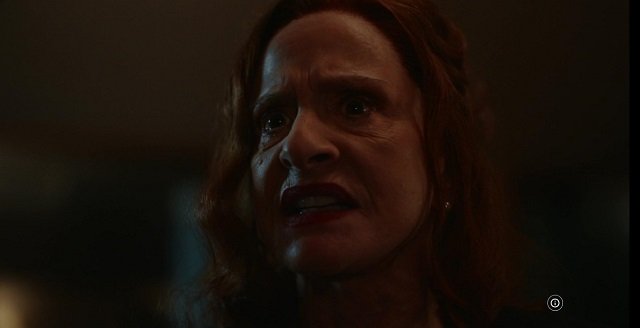

Now, where did Mona get all the money? Easy and sarcastic answer: they are Jewish, (what Jew doesn't have money?). Complex answer: Mona is a businesswoman, owner of her own brand of household, health, hygiene and even housing products. Almost all the things we see in the movie have her brand, Beau himself was the image in many of her products; the same building in an area infested with bad people where Beau lives, was given to her by his mommy; the brand of drugs is hers in collaboration with Pfizer, in short... Mona monopolized the commercial industry and used it as a vendetta against her own son. She knew that Beau was sick in the head because of her, but she keeps blaming and reproaching him for being a bad son and hurting her, for not loving her as she deserved. The story mixes many theories; many metaphors; many references to religion, psychology (especially psychoanalysis), social decline, among other aspects. Hence, the film can be interpreted as we see fit, they mixed multiple themes so that there is no one who has not understood the first time, or also as a reinforcement of what the story itself is about: terrible mothers and the feeling of guilt that they are capable of making us feel. Although little is left aside the social theme, the psychological affectation faced by many people of this middle-aged generation, the "easy way out" by self-medicating due to the high costs of a health system corrupted by capitalism. Anyway... there is a lot to be said about this movie, but it is truly a very thought-provoking story full of very strong messages; many would not understand it and would see it as if it were just another science fiction or fantasy film. So, my recommendation is that you at least watch Aster's short films since, within this film, there will be reviews of many of his works that help to better understand the context, and as I always say: "If you haven't seen it, see it, and if you have already seen it, see it again, you can't miss anything".

Ahora, ¿de dónde sacaba Mona todo el dinero? Respuesta fácil y sarcástica: son judíos, (¿qué judío no tiene dinero?). Respuesta compleja: Mona es una empresaria, dueña de su propia marca de productos para el hogar, salud, higiene y hasta de viviendas. Casi todas las cosas que vemos en la película, tienen su marca, el mismo Beau fue imagen en muchos de sus productos; el mismo edificio en una zona infestada de personas mal vivientes en donde vive Beau, se lo dio su mami; la marca de los fármacos es de ella misma en colaboración con Pfizer, en fin… Mona acaparó la industria comercial y la utilizó como vendetta contra su propio hijo. Sabía que Beau estaba mal de la cabeza por culpa de ella, pero sigue culpando y reprochándole todo a él por ser un mal hijo y lastimarla, por no amarla como ella merecía. La historia mezcla muchas teorías; muchas metáforas; muchas referencias sobre religión, psicología (sobre todo del psicoanálisis), declive social, entre otros aspectos. De ahí que la película pueda ser interpretada como mejor nos parezca, mezclaron múltiples temas para que no quede alguien que no haya entendido a la primera, o también como reforzamiento a lo que trata en sí la historia: madres terribles y el sentimiento de culpa que son capaces de hacer sentir. Aunque poco queda de lado la temática social, la afectación psicológica a la que se enfrentan muchas personas de esta generación de edad mediana, la “salida fácil” al automedicarse por los altos costos de un sistema de salud corrompido por el capitalismo. En fin… hay mucha tela que cortar con esta película, pero de verdad que es una historia que deja bastante que reflexionar y llena de mensajes muy fuertes; muchos no la entenderían y la verían como si se tratase de un film de ciencia ficción o fantasía más. Así que, mi recomendación es que al menos vean los cortos de Aster ya que, dentro de este film, habrá reseñas de muchas de sus obras que ayudan a entender mejor el contexto, y como siempre les digo: “Si no la han viso, véanla, y si ya la vieron, vuélvanla a ver, no tiene perdida de nada.”

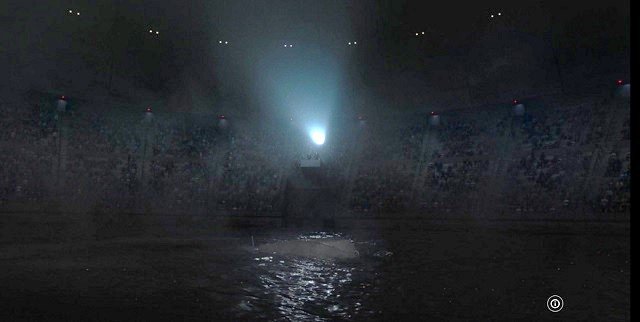

Thank you for coming here and reading me. | Gracias llegar hasta aquí y leerme.
🖤
Images taken from (Imágenes tomadas de) IMDb + GIF PhotoMosh
Esa película me agrada la actuación de Patti LuPone, un trabajo muy bien ejecutado
🖤
La mujer hizo un trabajo genial, aunque la verdad, deseaba que realmente hubiese dejado de extir en la vida de Beau.
I think they should kill Mona 😭😭😭😭
This show is a must watch for me and I'm bookmarking the post.
Reading your post made me dizzy for some time and all the words began blending into one, but I continued.
The family dysfunction is in bold and all caps cause what the actual hell?😂
If you got dizzy just reading, when you see it then you'll collapse xD hahaha. Ari kind of projects his traumas in his films, but they are still very good samples.
Una película bastante sobresaliente bizarra pero con un buen mensaje de fondo.
Es así, amigo. Es muy surrealista, pero deja mucho que reflexionar.